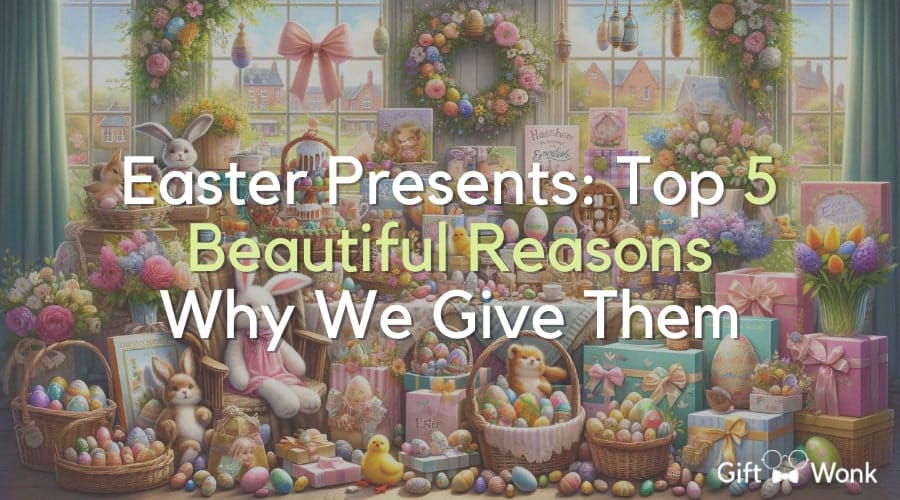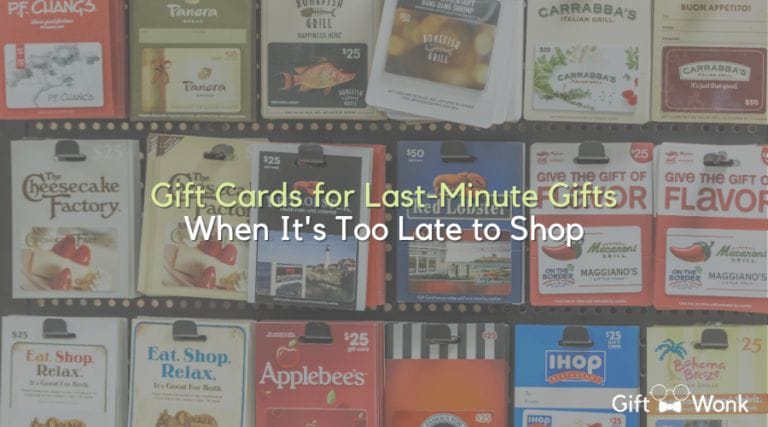
!! DISCLAIMER !! This site may contain Amazon & other affiliate links.
This means if you click on one of the product recommendation links, this site may receive a small commission. This is at no extra cost to you and may include exclusive discounts when possible. This helps support this site and allows us to keep making content like this. Thank you for your support!
Easter Gifts: Top 5 Reasons Why We Give Them
Easter, a season rich with joy and communal celebration, is not only about commemorating the resurrection of Jesus Christ but also about the cherished tradition of gift-giving.
From the reflective observance of Good Friday, which marks Jesus’ crucifixion, to the exultant festivities of Easter Sunday, celebrating His rise from the dead, the act of exchanging presents has become a heartwarming highlight.
This custom weaves together the historical and spiritual threads of Easter with a modern expression of sharing and caring.
As we gather in churches, partake in Easter customs, and revel in family traditions, the giving of gifts serves as a powerful symbol of life’s renewal and the hope that defines the season.
This article places the spotlight on the top five reasons why presenting gifts has become an integral and beautiful part of Easter celebrations, reflecting the joy and spirit of this time.
Essential Revelations: The Heart of the Matter:
- Easter is a Christian holiday that honors the resurrection of Jesus Christ.
- It is celebrated with church services, Easter customs, and the exchange of Easter presents.
- The historical roots of Easter can be traced back to ancient cultural and religious practices.
- Easter presents symbolize love, gratitude, and the joy of new beginnings.
- By giving Easter gifts, we can express our faith, strengthen relationships, and create cherished memories.
The History of the Easter Egg and Its Meaning
The history of the Easter egg can be traced back to ancient civilizations, such as the Egyptians and Persians, who used eggs as symbols of fertility and rebirth. In early Christian traditions, eggs were given as gifts during Easter to symbolize the resurrection of Jesus and new life.
The practice of decorating eggs also has its roots in ancient customs of coloring eggs to celebrate the arrival of spring. Today, the Easter egg is a significant symbol of the holiday and is often associated with the joy and renewal of Easter festivities.
The Significance of the Resurrection of Jesus in Easter Celebrations
The resurrection of Jesus is at the heart of Easter celebrations. According to Christian belief, Jesus was crucified and died on Good Friday, and then miraculously rose from the dead on Easter Sunday, three days later. This powerful event is seen as a triumph over sin and death, and is the foundation of the Christian faith.
The resurrection holds great significance for believers as it signifies the power of God to bring about new life and redemption. It is a symbol of hope, offering the promise of eternal life to those who have faith in Jesus. The resurrection of Jesus demonstrates God’s love and the ultimate sacrifice made for humanity’s salvation.
Easter Sunday, the day of Jesus’ resurrection, is considered the most important day in the Christian calendar and is commemorated with special church services, prayers, and hymns. These gatherings serve as a reminder of the joy and significance of Jesus’ resurrection and its impact on the lives of believers.
In the Christian tradition, the resurrection is not only a historical event but also a present reality that Christians can experience in their own lives. It represents a call to renewed faith, a fresh start, and a chance for spiritual growth and transformation.
The resurrection of Jesus brings hope and assurance to Christians, reminding them that no matter the challenges they face, there is always the promise of new beginnings and life in Christ.
How Easter Traditions Have Evolved Over Time
Easter traditions have evolved over time, influenced by various cultural practices and religious customs. The early Christian Church adopted and adapted existing pagan spring festivals, incorporating them into the celebration of Easter.
Over the centuries, different cultural and religious traditions have shaped the way Easter is celebrated around the world.
Today, Easter traditions vary widely, from the exchange of chocolate eggs and the Easter Bunny in Western countries, to the religious processions and church services in countries with a strong Christian heritage.
The evolution of Easter traditions reflects the diverse cultural and religious practices that have been incorporated into this holiday.
In Western countries, such as the United States, modern Easter celebrations often involve the exchange of chocolate eggs and the Easter Bunny.
Children eagerly participate in Easter egg hunts, searching for hidden eggs and enjoying the thrill of the search. The Easter Bunny has become a beloved symbol of the holiday, representing joy and abundance.
On the other hand, in countries with a strong Christian heritage, Easter is marked by religious processions and church services. These traditions emphasize the spiritual significance of Easter and the celebration of Jesus’ resurrection.
Overall, the evolution of Easter traditions has resulted in a rich tapestry of customs and practices, each representing different cultural and religious influences.
Whether it’s the exchange of chocolate eggs, religious processions, or other unique celebrations, Easter continues to be a time of joy, renewal, and cultural diversity.
Unique Easter Traditions Around the World
Easter is celebrated in diverse ways around the world, with each culture bringing its own unique traditions and customs to the holiday. These traditions reflect the rich cultural practices and beliefs that make Easter special in different parts of the world.
In the United States, one of the most iconic Easter traditions is the annual Easter Egg Roll held at the White House on the Monday after Easter. Families gather at the White House lawn to participate in an egg rolling race, where children push eggs across the grass using spoons.
This tradition dates back to the early 19th century and has become a beloved event for families.
In Greece, Easter Monday is marked by a vibrant tradition called “Rouketopolemos.” In the town of Vrontados, two rival church parishes engage in a symbolic “rocket war,” firing homemade rockets at each other’s church bell towers. The fireworks spectacle lights up the night sky and is a unique way to celebrate Easter.
In Poland, Easter Monday is known as “Śmigus-Dyngus.” This tradition involves playful water fights, where people playfully splash each other with water. It’s a fun and lighthearted way to celebrate the day after Easter and bring joy to families and communities.
The Symbolism of Easter Gifts: From Eggs to Bunnies
The tradition of giving Easter gifts has its roots in ancient customs and symbolizes the joy and celebration of Easter. People give gifts at Easter to show love, appreciation, and to celebrate the resurrection of Jesus.
Easter gifts often include symbolic items such as eggs, which represent new life and rebirth, as well as bunnies, which are seen as a symbol of fertility and abundance.
Choosing the perfect Easter gift involves considering the recipient’s preferences and interests, and tailoring the gift to reflect personal touches.
Thoughtful gift ideas for Easter include religious items, books, flowers, chocolates, and personalized gifts that celebrate the spirituality and joyfulness of the Easter season.
Why Do People Give Gifts at Easter?
Gift-giving at Easter is a way to express love and appreciation for family and friends. It is a tradition that has been passed down through generations and signifies the joyous nature of the holiday. By giving gifts, people also commemorate the resurrection of Jesus and the new life that it represents.
Gifts as Expressions of Rebirth and Renewal
Easter gifts, such as eggs and bunnies, symbolize rebirth and renewal. They serve as reminders of the transformative power of Easter and the hope it brings.
By giving gifts that embody these symbols, individuals celebrate the spiritual significance of the holiday and share in the joy of new beginnings.
Choosing the Perfect Easter Gift: Thoughtful Ideas for Everyone
When choosing an Easter gift, consider the recipient’s interests and preferences. Thoughtful gift ideas include:
- Religious items that reflect a person’s spiritual beliefs
- Books that inspire and uplift
- Flowers to symbolize the beauty of the season
- Chocolates and sweet treats for indulgence and enjoyment
- Personalized gifts that show thought and care
Tailoring Your Easter Gifts to Reflect Personal Touches
To make your Easter gift truly special, add personal touches that reflect the recipient’s personality and interests.
Consider their hobbies, favorite colors, and unique preferences. By tailoring your gift to their individuality, you show that you have put thought and effort into selecting something meaningful and memorable.
Gift Ideas that Celebrate the Easter Season’s Spirituality
Incorporating spirituality into your Easter gift can add depth and meaning. Consider gifts such as religious books, inspirational artwork, or handmade crafts that symbolize the spiritual significance of Easter.
By choosing gifts that celebrate the essence of the holiday, you help create a deeper connection to its spirituality.
Easter Baskets and Bunny Delights: A Joyful Celebration for All Ages
Easter baskets are a beloved tradition that brings joy and excitement to people of all ages. Assembling the perfect Easter basket involves filling it with a variety of treats, small gifts, and surprises. Ideas for Easter basket goodies include chocolates, candies, small toys, books, and personal care items.
The Easter Bunny plays a central role in the festivities, as the beloved character who delivers Easter baskets and hides eggs for egg hunts. The enchanting and playful nature of the Easter Bunny adds to the joy and anticipation of Easter celebrations.
Assembling the Perfect Easter Basket: Ideas and Inspirations
Creating an Easter basket that delights both kids and adults requires careful thought and consideration. Here are some ideas and inspirations to help you assemble the perfect Easter basket:
- Fill the basket with an assortment of chocolates and candies in different shapes and flavors.
- Add small toys or games that are age-appropriate and suit the interests of the recipient.
- Include books or activity books to promote reading and learning.
- Personalize the basket by adding items that reflect the recipient’s hobbies or favorite characters.
- Don’t forget to include some Easter-themed items like bunny ears, Easter stickers, or festive decorations.
Remember to consider the preferences and age group of the recipient when selecting items for the Easter basket. Tailoring the basket to their interests and tastes will make it even more special.
The Enchanting Role of the Easter Bunny in Festivities
The Easter Bunny is a beloved character that brings an element of enchantment and wonder to Easter celebrations. This friendly creature is often depicted as a furry, hopping bunny who visits homes and leaves Easter baskets filled with treats and goodies.
Children eagerly anticipate the arrival of the Easter Bunny, who is believed to hide eggs for egg hunts and playfully spreads joy and cheer.
The tradition of the Easter Bunny has its roots in various folklore and legends, symbolizing fertility, abundance, and the arrival of spring. The Easter Bunny has become an endearing symbol of Easter, captivating the hearts of both children and adults alike.
| Easter Basket Ideas | Age Group |
| Assorted chocolates and candies | All ages |
| Small toys and games | Children |
| Books and activity books | All ages |
| Personalized items | All ages |
| Easter-themed accessories | All ages |
Creative Ways to Celebrate Easter with Children
Easter is a special time for children, and there are many creative ways to celebrate the holiday with them. Engaging in fun activities and traditions not only brings joy and excitement to children but also creates lasting memories for the whole family.
DIY Easter Egg Decorating: Tips for a Fun Family Activity
One of the most popular and enjoyable Easter activities is decorating eggs. DIY Easter egg decorating is a perfect opportunity for children to unleash their creativity and showcase their artistic skills. Here are some tips to make it a memorable and fun family activity:
- Prepare the eggs: Hard-boil some eggs and let them cool before decorating. This ensures that the eggs are sturdy and safe for handling.
- Choose your decorating technique: There are various techniques to decorate Easter eggs, such as dyeing, painting, or using stickers and markers. Let your children choose their preferred method or try a combination of techniques for a unique look.
- Get creative with colors and designs: Encourage your children to experiment with different colors and patterns. Use vibrant dyes, paintbrushes, or markers to create intricate designs, or let their imagination run wild with fun stickers and decals.
- Add embellishments: To add an extra touch of creativity, provide your children with small embellishments like sparkles, ribbons, or googly eyes. These can be glued onto the eggs to create unique and personalized designs.
- Showcase the masterpieces: Once the eggs are decorated, display them in a decorative bowl or create a festive centerpiece for your Easter table. Admire your children’s artistic creations and celebrate their efforts.
Planning the Ultimate Easter Egg Hunt: A Guide for Parents
An Easter egg hunt is an exciting and cherished tradition that children eagerly anticipate. Planning the ultimate Easter egg hunt can create lifelong memories and joyous moments for your little ones. Here’s a guide to help you organize a memorable Easter egg hunt:
- Choose the location: Decide where the egg hunt will take place. You can organize it in your backyard, local park, or even indoors if the weather is not suitable. Make sure the location is safe and easily accessible for the participants.
- Create a hiding strategy: Before the egg hunt, strategically hide the eggs throughout the designated area. Consider the age range of the participants, hiding some eggs in easy-to-find places for younger children and more challenging spots for older kids.
- Set the rules: Establish clear rules for the egg hunt. Specify the boundaries, the number of eggs each child can find, and any special rules or prizes for finding certain eggs or completing specific challenges.
- Provide baskets or bags: Give each child a basket or bag to collect their eggs. Personalize them with their names or decorate them with Easter-themed stickers or ribbons.
- Start the hunt: Gather all the participants and explain the rules. Set a specific start time or give a signal to begin the egg hunt. Encourage the children to search for eggs and enjoy the thrill of the chase.
- Celebrate the finds: After the egg hunt is over, gather everyone together to count and compare their finds. Celebrate the joy of discovery and the excitement of finding the most eggs or special surprise-filled eggs.
By engaging in DIY Easter egg decorating and planning the ultimate Easter egg hunt, you can create treasured memories and bring extra excitement to your Easter celebration with children. These activities promote creativity, family bonding, and the joy of the Easter season. Get ready for a memorable and enjoyable Easter with your loved ones!
Easter Dinner Ideas: Making Your Feast Memorable
Easter dinner is a special occasion that brings family and friends together to enjoy a delicious feast. Traditional Easter dishes vary by culture and personal preferences, but often include roasted meats, such as lamb or ham, as well as side dishes like mashed potatoes, green beans, and deviled eggs.
Making your Easter feast memorable involves planning and preparing a menu that reflects your family’s traditions and favorites. Recipes for Easter dinner can range from classic and traditional to innovative and creative, depending on your culinary preferences.
Easter Candy and Chocolate Eggs: Sweet Gifts for a Sweet Occasion
Easter candy and chocolate eggs are synonymous with the holiday and are popular gifts and treats during Easter celebrations. From jelly beans and marshmallow Peeps to chocolate bunnies and cream-filled eggs, Easter candy offers a wide variety of confectionery delights.
Chocolate eggs, in particular, are a traditional Easter treat that symbolizes new life and rebirth. These sweet gifts add to the joy and sweetness of Easter festivities, and are enjoyed by both children and adults.
Incorporating New Easter Traditions into Your Celebration
While Easter is rooted in tradition, it is also a time to introduce new customs and activities into your celebration. Incorporating new Easter traditions can involve trying out different recipes, participating in community events, or engaging in family activities that create lasting memories.
For example, you can organize a family picnic, have a themed Easter party, or contribute to a charity in the spirit of giving and gratitude. By incorporating new traditions, you can make your Easter celebration unique and meaningful for your family.
Adding new traditions to your Easter celebration allows you to infuse the holiday with fresh excitement and create lasting memories for your family. Here are some ideas to get you started:
- Try out different recipes: Experiment with new Easter recipes that reflect your family’s tastes and cultural backgrounds. From unique side dishes to innovative desserts, exploring new culinary creations can add a delicious twist to your Easter feast.
- Participate in community events: Check local listings for Easter-themed events happening in your community. From egg hunts to parades, these events provide opportunities for your family to engage with the community and connect with others who share the joy of Easter.
- Engage in family activities: Plan activities that foster quality family time and create lasting memories. Whether it’s crafting Easter decorations, playing outdoor games, or going on a family hike, these activities can bring you closer together and make your Easter celebration even more special.
- Create traditions of giving: Incorporate acts of kindness and charity into your Easter celebration. This can include donating to a local food bank, volunteering at a shelter, or organizing a fundraiser for a cause that is meaningful to your family. By giving back to the community, you can spread the spirit of Easter and make a positive impact.
Remember, there are no rules when it comes to incorporating new Easter traditions. The most important thing is to make your celebration meaningful to you and your loved ones. So, embrace creativity, explore new ideas, and create an Easter celebration that reflects your family’s values and interests.
Easy Ways to Make Your Easter Celebration Unforgettable
Making your Easter celebration unforgettable involves adding special touches that create a festive and memorable atmosphere. Easy ways to enhance your Easter celebration include decorating your home with colorful Easter decorations, such as spring flowers, pastel-colored table settings, and Easter-themed centerpieces.
You can also provide entertainment for your guests, such as Easter-themed games, music, or storytelling.
Additionally, prioritizing quality family time and creating opportunities for joyful moments and shared experiences will make your Easter celebration truly unforgettable.
The Golden Egg of Goodbye: Parting Easter Insights
Easter, a holiday rich in meaning and tradition, is celebrated worldwide as a time of renewal, hope, and joy, commemorating the resurrection of Jesus. The holiday’s customs, from exchanging gifts to sharing meals, reflect its deep historical and cultural significance.
Embracing the traditions and symbolism of Easter can enhance the celebration, making it a profound occasion to connect with loved ones and honor the themes of rebirth and triumph that define the season. Incorporating personal and innovative elements into your festivities can add depth, making each Easter memorable and unique.
Frequently Asked Questions (FAQs)
Q: What is the tradition of Easter and why do we give presents?
A: The tradition of Easter has deep roots in Christian culture, commemorating the resurrection of Christ, which is a cornerstone of faith symbolizing new life and rebirth. Giving presents during Easter is a way to share joy and symbolize the new life that Easter represents. It’s a great opportunity to bring family together and strengthen bonds through the exchange of thoughtful gifts, often associated with Easter themes such as eggs, bunnies, and chickens.
Q: Why are eggs associated with Easter and commonly given as presents?
A: Eggs have long been associated with Easter as symbols of new life and resurrection, mirroring the resurrection of Christ and the promise of life for us. This tradition has ancient roots and eggs represent rebirth and fertility. Giving eggs as gifts during Easter is a nod to these deeper meanings, and over time, the practice has evolved from gifting real eggs to including chocolate and plastic Easter eggs filled with small gifts or candies.
Q: Can you tell me about the first Easter and how it is linked to the tradition of giving Easter presents?
A: The first Easter marks the resurrection of Christ, which Christians celebrate as the cornerstone event of their faith. This miraculous event is said to have happened three days after Christ’s crucifixion, a story central to the Easter holiday. The practice of giving presents during Easter can be seen as an extension of the joy and gratitude felt for this event. Over the centuries, many of the traditions surrounding Easter, including giving gifts, have become ways for believers and non-believers alike to remember and share in the essence of this pivotal moment.
Q: How did the tradition of the egg roll become part of Easter celebrations?
A: The tradition of the egg roll during Easter is thought to symbolize the rolling away of the stone from Christ’s tomb, leading to his resurrection. This activity, especially popular in Western countries, involves rolling decorated eggs down a hill, with the intact egg winner symbolizing the giver of life. This tradition has evolved into a fun Easter activity, bringing children and families together, and is one of the many customs that use Easter symbols to teach and celebrate the underlying messages of hope, new beginnings, and life.
Q: Why is Easter considered the most important holiday in Christian faith?
A: Easter is the most important holiday in the Christian faith because it celebrates the resurrection of Christ, which is the very foundation of Christianity. Believers hold that Christ’s death and resurrection offer the promise of eternal life for all who have faith, making Easter a time of great joy, reflection, and renewal. The diverse traditions and practices around the Easter weekend, from church services to egg hunts, all serve to honor this pivotal event and its profound impact on Christian doctrine and believers’ lives.
Q: How do Easter eggs around the world celebrate the holiday?
A: Around the world, Easter eggs are celebrated and used in a variety of customs that reflect local traditions and beliefs. In many countries, eggs are painted, decorated, and exchanged as gifts to celebrate Easter. In Eastern Europe, for example, intricately painted eggs are a popular tradition, while communities in other parts of the world might organize egg hunts or egg rolling competitions. These global variations all underscore the universal themes of renewal, rebirth, and joy that are central to the Easter holiday.
Q: How has the tradition of Easter evolved over time?
A: Over the centuries, the tradition of Easter has evolved to encompass a wide range of customs and practices, from the deeply religious to the purely celebratory. While the core religious observance of Christ’s resurrection remains at the heart of the holiday, many cultural elements have been woven into the Easter celebration. This includes the adoption of symbols like the Easter bunny and Easter eggs, which have pre-Christian origins but have been repurposed to fit Christian festivities. Such evolution reflects the dynamic nature of cultural practices and the ability of societies to blend old and new beliefs into meaningful celebrations.
Q: What are some unique gifts for Easter?
A: Gifts for Easter can range from traditional to creative, aiming to capture the spirit of joy, renewal, and life that the holiday signifies. Beyond the usual chocolate eggs and bunny figures, unique gifts could include hand-painted egg ornaments, personalized Easter baskets, spring-themed decor, books that reflect the themes of new beginnings, or even experience gifts like a family outdoor adventure to celebrate the season of renewal. It’s all about choosing something that brings joy and maybe even a new tradition to the recipient’s Easter celebration.






